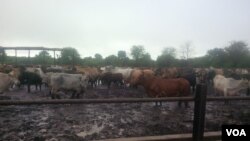The International Fund for Animal Welfare (IFAW) has saved thousands of farm and companion animals stranded by extreme flooding in Malawi. But more than 90,000 animals have died and many more suffer from disease, hunger and injury.
Torrential rains hit in early January. Thousands of people fled the rising waters while many animals, including cattle, goats, pigs, sheep, dogs and chickens, were left to fend for themselves.
Cattle and small farm animals are the capital wealth of the southern Malawi subsistence farmers. They put their children through school and feed and clothe the family with income derived from their animals, hence the despair of so many who lost animals.
Government statistics show that in the worst hit district of Nsanje, losses included 5,000 cattle, 38,000 goats and 11,000 sheep, while many more animals remain vulnerable to starvation and disease as floods continue to wreak havoc.
Alidi Bandawe, a subsistence farmer in the southern district of Phalombe, said the loss of his farm animals has put him in desperation.
"I had seven cattle, six goats and seven chickens; I lost all these to floods because of the flooding of the Phalombe river in an area where I was keeping my animals all them were flooded into the lake [Chirwa],” said Bandawe.
Bandawe said the animals were a source of income for him, especially during the growing season when he would kill one and sell the meat to buy fertilizers and also pay people who were assisting him in his maize field.
Abida Sidick Mia is the managing director for S&A Cold Storage and S&A Beef Masters. She said the company has lost 95 head of cattle to floods in one of the worst hit districts, Chikwawa.
“The floods have affected us in the sense that the pens which the animals stay have been flooded with water and because of the dung, a lot of the livestock was drowning in their own dung, so even if we try to push it out but because it is not on a slope, we are still having huge losses, maybe losing about six or five [livestock] a day,” said Mia.
Veterinary experts say there is great risk that surviving animals could suffer from flood-related diseases. To prevent this, the International Fund for Animal Welfare (IFAW) began relief operations in two areas of southern Malawi that have borne the brunt of the rains.
In Nsanje and Chikwawa districts, the organization has been vaccinating and treating farm animals against common diseases such wet conditions can encourage.
"The reason that these areas were targeted is that to people in these areas cattle is a capital so the point is that the time they had to abandon their homes, the cattle was left behind and what happens is that because of excessive rain the cattle has started showing the signs of diseases and illness that are caused by excessive rain,” explained Christina Pretorius, the IFAW Communications Manager for Southern Africa.
Pretorius said they have managed to vaccinate about 10,000 animals in collaboration with the Veterinary Department of Malawi’s Ministry of Agriculture.
She noted, however, that many places are not accessible because of damaged roads.
“It’s been incredibly difficult to get to many areas as we wished because they have been cut off by flood waters. So there is a sad story that the flash flood came in the mid of night and the best people could do was to save themselves and watching the cattle, and the dogs and chicken being washed away around them,” she said.
Ministry of Agriculture spokesperson Tione Chowe told VOA the government is going ahead with vaccinating surviving animals and showing livestock farmers proper ways of constructing kraals (enclosures) as the torrential rains and floods continue, especially in southern Malawi.





